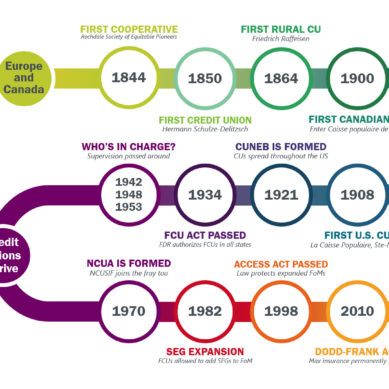For many Americans, getting a credit card, purchasing a new car, or buying a home is nearly impossible. The lengthy process, restrictive requirements, opaque credit scoring system, and limited explanations (or recourse) for rejection can frustrate and frighten away many worthy applicants, including those with little or no credit histories.
I should know; I was one of them.
In 2004, I immigrated to the U.S. from India to study for my master’s degree in electrical engineering. When I tried to buy a home after completing my degree and working for a year, I found the process to be so daunting that I backed away. I knew I was an excellent candidate—I had an advanced degree and a good job in a growing industry. But as a first-generation immigrant and a woman of color with a limited credit history, it felt like the deck was stacked against me.
Ultimately, it took me almost ten years before I felt confident enough to buy a home. During this time, I built up my credit history and became financially literate in the American economy. I paid off a car loan and successfully managed a series of credit cards—the first of which I got my first through my university. It had a $400 limit. Today, I’m troubled by the fact that the same problems I faced when I arrived in the U.S. almost two decades ago persist.
America’s consumer lending system can be complex, restrictive, and discriminatory. But it doesn’t have to be. Technology can improve the process and outcomes and reduce historical disparities built into the traditional credit scoring system. In particular, artificial intelligence (AI) can safely enable lenders to approve potential borrowers with modest credit histories.
Leaning too heavily on too few variables
Many financial services professionals would welcome a change to the credit system. Zest AI polled professionals from banks and credit unions attending the Money 20/20 conference last year and the NACUSO Network Conference in 2020. In both cases, more than 80 percent of those we talked to said using AI and machine learning more would improve credit scoring.
Credit scoring remains the central component of the current loan application process. But FICO scores draw from a small number of variables, and the methodology behind them hasn’t changed much in 50 years. FICO developed the scoring system for a society that was much less diverse than the one we live in today. As a result, it can perpetuate, rather than mitigate, historic patterns of discrimination.
AI can provide a far more accurate and comprehensive risk assessment by instantly evaluating hundreds of data points on each loan applicant. Consequently, banks and credit unions can approve good borrowers they would have otherwise turned away.
Based on so few metrics, today’s industry scores don’t give credit unions’ systems enough inputs to accurately distinguish between two applicants with identical scores who don’t necessarily represent the same level of risk.
When lenders auto-approve only those applicants with FICO scores above 750 and auto-reject applicants with scores below 600, they leave the middle ground—encompassing the vast majority of credit applications—for manual review. This slows down the process, increases costs, and creates inconsistencies, as no two people will view an application the same exact way. AI can shrink the number of applications that require manual review without increasing risk and help lenders identify deserving applicants who would have been declined because of their industry credit score.
AI also enables more auto-approvals and accelerated decision times. As people expect Amazon-level speed everywhere, lenders that can’t provide nearly instant answers risk seeing customers go elsewhere.
Widening access
AI boosts inclusive credit access. Its machine-learning algorithms can reduce bias by de-emphasizing signals that frequently indicate applicant characteristics such as race or gender. Through less-biased credit scoring, credit unions can serve more members.
And minority borrowers need the help. The National Credit Union Administration (NCUA) studied loan-level data for 2020 and 2021 from the Home Mortgage Disclosure Act and found that all else equal, lenders were more likely to reject minority applicants’ loan applications and were more likely to offer less favorable pricing on the loans they approved.
To truly deliver on their community-focused mission, credit unions especially should explore the possibilities AI-driven lending offers. The industry is primed for mass adoption. Thanks to cloud delivery, powerful AI-based systems no longer require the expensive hardware or huge financial investments that once restricted AI access to only the largest banks. Furthermore, AI systems are easily configurable and can be adapted to fit each credit union’s needs.
Serving the underserved
For my part, I feel I was born too soon. If AI-driven lending had been available, I wouldn’t have had any problems with a loan, saving me years of stress and giving me more time to build equity in my home. I’m excited at the possibility of AI saving others, including those immigrating to the United States, from that same fate while lenders can do the right thing while making smart economic decisions for their businesses.
The thin-file applicants they serve today could be loyal customers for life—all thanks to AI-driven lending.

























































